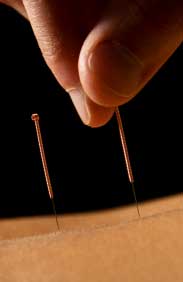A groundbreaking new study concludes that acupuncture treatments correlate to improvements in symptoms experienced by lung cancer patients. The study notes that lung cancer patients experience pain, depression, anxiety, nausea and a lack of well-being associated with either the disease or cancer treatments. The researchers discovered that a minimum of six acupuncture treatments was required to exert a 70% chance of a “clinically important improvement in well-being.”
 The study demonstrated that acupuncture treatments improved symptoms including pain, appetite loss, nausea, anxiety and an overall feeling of well-being. The researchers note that there is a clinically significant and positive correlation between the number of acupuncture treatments and the measure of improvements in the lung cancer patients. As a result, the researchers note that acupuncture “may be an effective approach for improving symptoms—in particular, pain and well–being—in lung cancer patients.” They also noted that acupuncture is minimally invasive and is a safe procedure and suggest that it is useful for “patients undergoing anticancer treatment.” In addition, acupuncture was shown to significantly reduce pain levels in 61% of lung cancer patients.
The study demonstrated that acupuncture treatments improved symptoms including pain, appetite loss, nausea, anxiety and an overall feeling of well-being. The researchers note that there is a clinically significant and positive correlation between the number of acupuncture treatments and the measure of improvements in the lung cancer patients. As a result, the researchers note that acupuncture “may be an effective approach for improving symptoms—in particular, pain and well–being—in lung cancer patients.” They also noted that acupuncture is minimally invasive and is a safe procedure and suggest that it is useful for “patients undergoing anticancer treatment.” In addition, acupuncture was shown to significantly reduce pain levels in 61% of lung cancer patients.
The treatment methodology consisted of six body style acupuncture points and three auricular acupuncture points. The body style acupuncture points were LI4, LV3, ST36, SP6, P6 and LU7. The three ear acupuncture points were Shenmen, Subcortex and Point Zero. Acupuncture needles were inserted until a de-qi sensation arrived. The needles were retained for 30 minutes and manually manipulated every ten minutes. The patients received acupuncture treatments between one to two times per week. Treatment period durations ranged from 4 weeks to 26 weeks.
Most patients suffered from advanced stage lung cancer when admitted to the study. A total of 67% of the patients were undergoing chemotherapy or radiation therapy. Other patients were admitted to the study after surgical resection of the lung cancer tumor(s). Acupuncture significantly improved the condition for most of the patients and the researchers conclude that acupuncture is feasible and safe.
The researchers cited several studies showing that acupuncture exerts its effective action in several ways. Acupuncture stimulates the release of naturally occuring opioids in the body, triggers electrophysiological responses in the nervous system and stimulates the release of neurotransmitters, neuropeptides and other hormones involved in several aspects of human health. The researchers note that these mechanisms may explain the ability of acupuncture to regulate blood pressure and bodily temperatures, benefit the immune system, exert anti-inflammatory responses and improve the overall condition of lung cancer patients.
Reference:
Kasymjanova, G., M. Grossman, T. Tran, R. T. Jagoe, V. Cohen, C. Pepe, D. Small, and J. Agulnik. "The potential role for acupuncture in treating symptoms in patients with lung cancer: an observational longitudinal study." Current Oncology 20, no. 3 (2013): 152.

